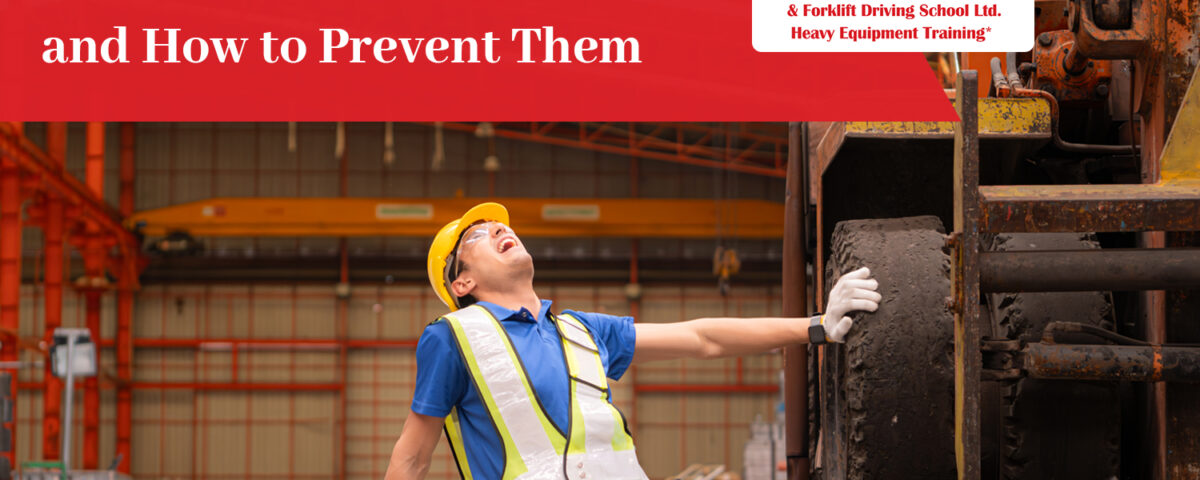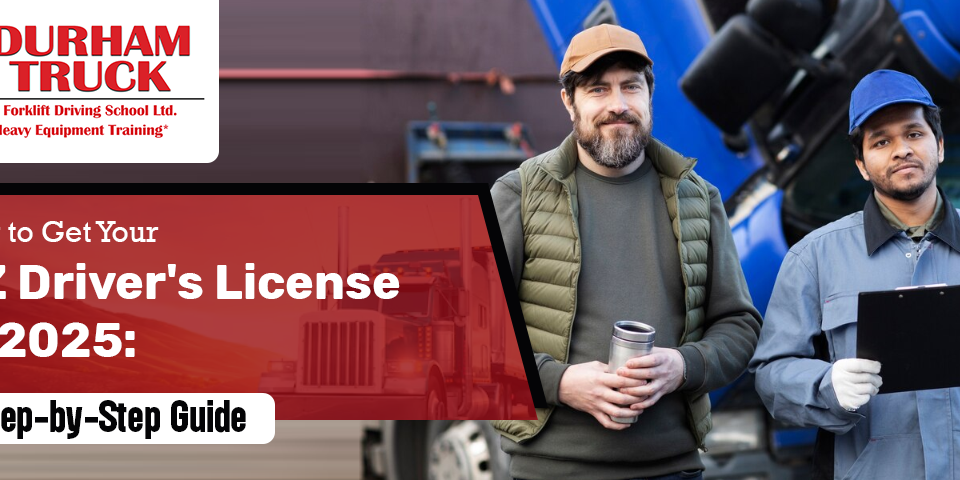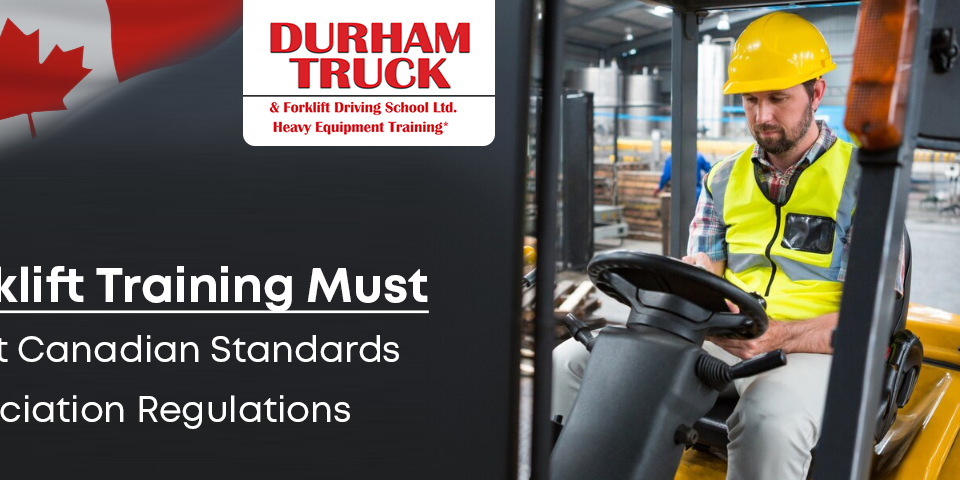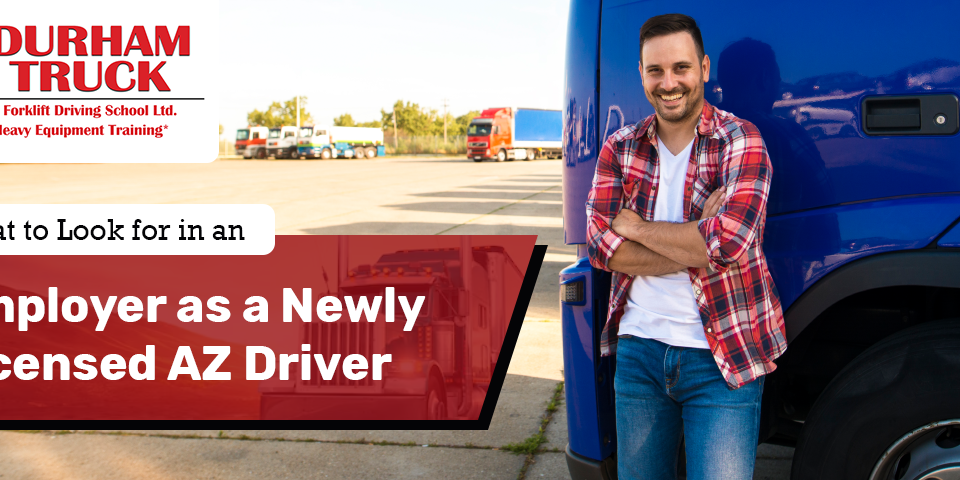Common Forklift Accidents and How to Prevent Them

How Long Does Truck Driving School Take?
June 17, 2024
Top 10 Safety Tips for Operating a Counterbalance Forklift
July 20, 2024We prioritize safety at Durham Truck and Forklift Driving School Ltd.. Forklifts are essential tools in many workplaces. Still, their immense power can pose a significant risk if not operated correctly. Here, we’ll delve into the most common forklift accidents and equip you with the knowledge to prevent them, ensuring a safe and productive work environment.
Top Forklift Accident Threats:
- Tip-Overs: Forklifts have a high center of gravity, making them susceptible to tipping over. This can happen due to:
- Overloaded or Uneven Loads: Exceeding the Forklift’s weight capacity or carrying an unbalanced load disrupts its center of gravity, increasing the risk of a tip-over.
- Traveling at Excessive Speeds: Taking corners or maneuvering on uneven terrain too fast can quickly destabilize the Forklift.
- Improper Lifting Techniques: Raising or lowering loads too quickly or at unsafe angles can cause the Forklift to tip forward or backward.
2. Falling Objects: Accidents involving falling objects from forklifts pose a severe threat to operators and pedestrians. Common causes include:
- Unsecured Loads: Loose materials or improperly stacked pallets can easily topple off the forks during transport.
- Improper Lifting Techniques: Similar to tip-overs, jerky movements can dislodge items when raising or lowering loads.
- Damaged or Bent Forks: Bent or damaged forks can compromise the stability of the load, increasing the risk of items falling.
3. Pedestrian Accidents: Forklifts operating in busy warehouses or workplaces create a risk for pedestrians. Common causes include:
- Limited Visibility: Operators with obstructed views due to the load or blind spots around the Forklift can easily collide with pedestrians.
- Lack of Communication or Awareness: Pedestrians unaware of a forklift’s presence or operators not signaling their movements can lead to accidents.
- Inadequate Pedestrian Separation: The absence of designated walking areas or physical barriers to separate pedestrians from forklift traffic creates hazardous situations.
4. Falls from the Forklift: Operators can sustain severe injuries if they fall from the Forklift. This can happen due to:
- Exiting the Forklift Improperly: Jumping off the Forklift without following the designated steps is a recipe for a fall.
- Horseplay: Engaging in any play behavior while operating a forklift is extremely dangerous.
- Inadequate Use of Seatbelts: Seatbelts offer crucial protection during sudden stops or collisions.
5. Mechanical Failures: While less common, malfunctioning forklifts can pose a significant threat. This highlights the importance of regular maintenance and pre-operation checks.
Essential Safety Measures to Prevent Forklift Accidents:
- Comprehensive Forklift Operator Training: Durham Truck and Forklift Driving School Ltd. provides industry-leading forklift training programs that equip operators with the knowledge and skills to handle these powerful machines safely. Our courses cover everything from pre-operation checks, safe driving practices, load handling techniques, and hazard awareness.
- Pre-Operation Inspections: Before starting a shift, operators should thoroughly inspect the Forklift. This should include checking for leaks, tire pressure, damage to forks, and proper functioning of brakes, steering, and warning systems.
- Safe Load Handling Practices: Ensure the load weight falls within the Forklift’s capacity. Secure loose materials with straps or netting. Center the load evenly on the forks and keep the mast tilted back when transporting to improve stability.
- Maintaining a Safe Speed: Speed limits are in place for a reason. Operate the Forklift at a slow and controlled pace, especially when making turns or traveling on uneven surfaces.
- Pedestrian Safety Measures: Clearly define designated walking areas and implement physical barriers to separate pedestrian traffic from forklift zones. Ensure pedestrians wear high-visibility clothing in areas where forklifts operate.
- Seatbelt Use: Always wear your seatbelt when operating a forklift. This can significantly reduce the risk of injury in case of an accident.
- Regular Maintenance: Schedule regular maintenance checks for your forklifts to identify and address potential mechanical issues before they lead to accidents.
- Maintaining a Safety Culture: Employers should actively promote forklift safety by providing ongoing training, encouraging safe practices, and holding operators accountable for following safety protocols.
By prioritizing these safety measures, workplaces can significantly reduce the risk of forklift accidents. At Durham Truck and Forklift Driving School Ltd., we provide comprehensive forklift training that empowers operators to work safely and efficiently. Remember, safety is not an option; it’s a necessity.




